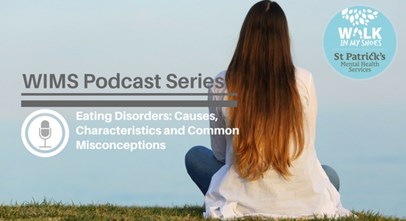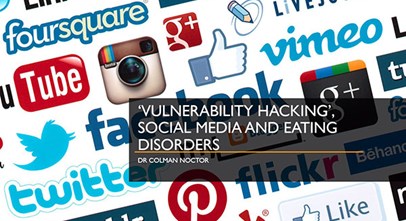
A young woman shares her experience of living with anorexia nervosa.
Niamh O’Keeffe is one of those people that is just a pleasure to be around. She is warm, engaging and open, with a great sense of humour and brains to burn – she works with hedge funds, mergers and complex financial services that feel impenetrable to most of us mere mortals, but she loves it.
Sitting in a busy city centre café, having an animated chat, none of the people sitting at the tables around us could possibly guess what we’re talking about.
“I was a monster; I hated myself; I wanted to die. The one thing I was excelling at, in my mind, was anorexia”.
Niamh spent much of her adolescence and early 20s living with anorexia and depression. Spoiler alert – she’s fine now, but, for a long time, she really wasn’t.
I didn’t feel the best at anything. I didn’t have a close group of friends. I wasn’t wanted.
It all started when she began secondary school. Essentially, Niamh felt as though she wasn’t wanted and just didn’t fit in. Like anyone starting a new phase in life, Niamh had ideas about what she’d be good at academically, what her social circle would be like and generally how the experience would feel. Essentially, she wanted to do well at her work and click with new friends.
Instead, what happened was a relentless exercise in comparison, with Niamh always coming up short, in her eyes at least. There was always someone smarter, prettier, cooler, more popular – and on and on it went. What cut through the noise of these insecurities was image. Niamh noticed that some of the other girls in school were thinner than her: “I gradually started looking at calories, working out a lot, competitive swimming. I lost a lot of weight during that time”.
Understandably concerned by these changes, Niamh’s parents sought some help for their daughter in the form of a spiritual healer. No one knew at that time that what was emerging was an eating disorder. The general consensus was that this was a kind of blip, common enough at a time of great change in an adolescent’s life. Niamh felt as though she got some peace from that initial intervention, and things began to settle down again – but the underlying causes of her unhappiness weren’t addressed, and soon they resurfaced.
“Two years later, I saw one of my friends had lost a significant amount of weight, and it just triggered me”.
The smaller I am, the better my life will be.
By the time Niamh was in fifth year at school, she was depressed, eating less than 500 calories a day, and trapped by the thought that she could only achieve what she wanted in life if she was as skinny as she could possibly be. Her body was feeling the effects of starvation: “my periods stopped; my mind was in bits; I could feel how weak I was and I had completely lost the ability to think rationally – but I didn’t want to get better”.
Niamh was prescribed a number of different anti-depressants at this time, none of which worked for her. She also had trouble accessing appropriate services as her Body Mass Index (BMI) was so low that a number of psychiatrists advised she was unsuitable for treatment. She attended a dietician, but, in the grip of her eating disorder and depression, Niamh had no interest in eating or changing her relationship with food.
“At the start, it was tough, but I had a little bit of body weight to carry me through it. The thinner I got, the more fixated I became, and my body had no reserves; the impact of that stress on my brain had a really negative impact on my thoughts and mood”.
I gained one kilo and started screaming, shouting, pulling out my hair. I just wanted to die.
The rigid thinking, perfectionism and need for control that characterises anorexia is perfectly illustrated by an incident that happened during this time. A weigh-in during a consultation showed that Niamh had gained one kilogram (kg) since her last appointment. Her reaction to this slight increase in weight was extreme.
“I went crazy: I was screaming, shouting, pulling out my hair. I kept shouting ‘I hate my life, I hate my life, I hate it’. I just wanted to die. Basically, I felt that I had nothing if I wasn’t 40 kgs”.
That evening, Niamh went home and walked 30 kilometres (km).
Throughout four years of depression and anorexia, Niamh never thought she was too thin, never identified as anorexic and was never happy with her weight.
The worst part of the experience?
“There wasn’t one day for four years where I didn’t have a panic attack about my weight. I’d get dressed for college and take multiple photos of myself from every angle, and, if I didn’t look skinny in them, I’d rip off my clothes, pull my hair, and just wouldn’t go to college. It was so intense and so exhausting”.
One day, I started to smile again.
The turning point in Niamh’s story came when she began attending St Patrick’s Mental Health Services (SPMHS). Her consultant at the time, Dr Sarah Prasad, instantly recognised that the various anti-depressants Niamh had been prescribed over the years were incompatible with her biochemistry. “She prescribed a different type of medication and, honestly, within two weeks, my whole mindset changed”.
The improvement in Niamh’s mood meant that, although her relationship with food remained the same, she started to feel as though she might want to get better. It was the tiniest spark, but a spark nonetheless. Niamh even started to consider her future, but “skinny was still the most important thing at that moment”.
The spark that had reignited in Niamh gradually grew. It meant she could draw on the positive energy of those around her. “I got to a stage where I could enjoy being around other people. I was able to occasionally laugh with my friends. Some of my taste buds started to come back around this time too”.
These embers of joy stoked Niamh’s desire to get better and live her life again. “I had to let myself let it in though… the medication let me enjoy other people’s company again, but stubbornness can, and does, stop people from getting there”.
Regaining weight was one of the hardest parts.
As Niamh’s treatment under Dr Sarah Prasad, and then Dr Clare O’Toole, continued, she slowly began to recover. Confronting the underlying causes of her unhappiness helped her to challenge the beliefs that fuelled her eating disorder. Learning Cognitive Behavioural Therapy (CBT) techniques allowed her to examine situations, see thought patterns more clearly, and identify the choices that were available to her. Her support network provided the positive energy that sustained her when her reserves were low.
As her recovery progressed, one of the biggest challenges was yet to come. "The hardest part for me was regaining weight. Because my mood had been gradually getting better, I could hear what the doctors were saying to me about needing to give my body nutrients”.
Niamh’s body had been in starvation mode for so long that she had to be really careful about how she did this. “I started to do it through exercise – I’d go to the gym, working on weights rather than cardio. I’d feel really hungry afterwards and feel able to eat well as a result”.
Choosing balance over obsession.
It wasn’t easy – and it can still be a challenge. Niamh says she still cares about not wanting to be overweight, but that is coming from a place of health now, rather than a need to control. Having obsessed over every calorie in every morsel for years, Niamh can’t unlearn that information, but she can choose not to be controlled by it.
“I can feel tempted to go back to it, but I can catch it. I have the tools to manage it. I’m always going to be aware of it – now, I just try to keep a handle on roughly the calories I’m consuming – but more from the perspective of being healthy. Plenty of people who’ve never had an eating disorder, or disordered eating of any kind, do that. The difference is that, during my anorexia, every fraction of a calorie was calculated and, if I went over my limit, that was unbearable. I believed everything would fall apart – that was how intense my need to control was. Now though, I know it’s not the end of the world if I have a slice of cake with my cup of tea: I can enjoy it”.
Niamh finds that CBT helps her to keep things balanced, to catch triggers, and to see potential problems before they happen. Incorporating meditation into her CBT practice allows her to slow down, and to develop an awareness of her thoughts and feelings and how they, in turn, might influence her choices.
I’m excited about my life.
It’s hard not to be struck by the hard work Niamh has put into her recovery and how she continues to prioritise her health. She is keen to highlight the role of her support system in helping her to get there though. “Imagine watching your child hate herself so much, wanting to destroy herself. It was so hard for my parents, but they saved me”.
The combination of self-obsession and exhaustion that dominated life during her illness meant that Niamh didn’t – or couldn’t – really care about anybody else, but her parents and close friends never gave up on her. “When I had literally no strength in me, they brought positive energy – I fed off that. I got to a stage where I was able to absorb that energy, and it helped to fuel my recovery”.
Sitting opposite someone so clearly full of life, it’s hard to comprehend that, at one time, she hated her life, hated being alive. Control was everything. “I felt as though I had a lack of control over my life, how I wanted my experience to be. My anorexia happened at transitional periods in my life. I felt unfulfilled: I compared myself to peers and I turned to anorexia for control. If I have this under control, everything will be under control - but the opposite is true”.
Niamh’s desire to have some kind of future began to emerge during treatment, but her idea of what that might look like has changed significantly since then. “At that time, any future I imagined was one where I’d be living a cold, workaholic, business-based life; existing rather than living, I guess. I had no desire for a future with family, babies and now I can’t wait for that phase of my life. I’m excited about my life”.
And you can’t help but be excited for her.
--
If you, or someone you know, might be living with an eating disorder, you can find more information here on our website or through Bodywhys. You can also visit our Frequently Asked Questions page for more information about mental health and our services.
Tags: Testimony eating disorders
Related articles and podcasts
Continue to…
Singing the praises of choirs

